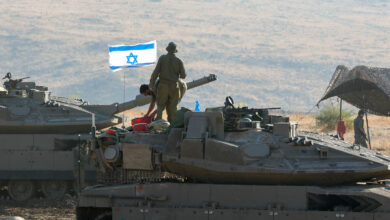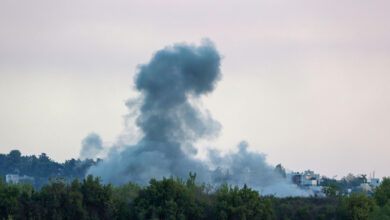Syrian tribes call for Coalition help after Rukban aid convoy met with ‘aggression’
A major tribal council in Syria's Rukban camp called on the US to disarm militias in the area
Tribal representatives in a remote camp in southeast Syria for displaced people asked the U.S.-led Coalition against ISIS to take control of the settlement last week after a United Nations and Syrian Arab Red Crescent were forced to cut short an aid mission.
Sources familiar with the incident told The Defense Post that the U.N./SARC team was nearly finished distributing aid in the camp on September 11 when it was overrun by civilians fearing they would not get enough food.
The aid convoy was the first to arrive in the camp in seven months.
The Rukban camp, isolated in the inhospitable Syrian desert just a few kilometers from the closed Iraq and Jordanian borders, houses between 12,500 and 25,000 Syrians who fled the country’s eight-year civil war.
Many of the camp’s residents fled the Syrian government and Islamic State and arrived in the area seeking the protection of a nearby U.S. Army Special Forces base at al-Tanf. But the U.S. has so far refused to intervene in the camp, leaving a local U.S.-supported Vetted Syrian Opposition militia, Maghawir al-Thawra, to police the area and secure aid convoys.
A U.N. spokesperson confirmed its personnel were forced to evacuate the camp last week.
“During the food distribution, U.N./SARC teams were exposed to increased tensions and aggression. A rapid security deterioration led to the evacuation of U.N./SARC teams from the distribution site,” U.N. Office for the Coordination of Humanitarian Affairs spokesperson Hedinn Halldorsson told The Defense Post via email.
“During the aid delivery some 3,000 families were provided with food and nutrition supplies for one month,” Halldorsson said.
SARC on September 8 said that 22 trucks carried aid to Rukban.
Halldorsson did not indicate that armed factions were involved in the unrest.
The aid convoy was part of an ongoing U.N. mission “to support the departures of families who wish to leave voluntarily to government-controlled areas.”
“The entire operation is conducted in line with humanitarian principles and minimum protection standards,” an OCHA statement on September 12 read.
In August, a U.N. team conducted a survey in the camp “to identify civilians wanting to and seeking support to leave the area.”
“A needs assessment carried out in August found that a total of 37% (out of 12,700) stated they want to leave Rubkan while 47% want to stay. The remaining 16% were undecided,” Halldorsson told The Defense Post.
But civilian councils in Rukban have objected to the U.N.-facilitated returns, saying the Syrian government is “exploiting” the convoy to lure displaced people back to its territory.
The U.S. government has repeatedly accused the Syrian government of blocking U.N. aid convoys from the area in an attempt to coerce camp residents back to government-held territory.
The area around the camp and U.S. base, known as the 55-km deconfliction zone, is largely surrounded by pro-Syrian regime forces.
Last week’s aid shipment did not include sufficient amounts of medical supplies, said Omar al-Homsi, a civilian representative in the Rukban camp.
“But the U.N. promised us medicine will come to the camp.”
“After the convoy, we don’t know if the camp will be besieged again or not,” al-Homsi said.
“If things continue like this, we will be forced to return to the regime,” he said. “Even the Americans told the tribal leaders that they’d be upset if civilians continued to leave.”
Coalition protection for Rukban
On Friday, a tribal representative told The Defense Post that his side formally asked Coalition forces in the area to take control of Rukban and help provide formal means of sustainable supply for the families of the camp.
He also said the tribes asked the Coalition to dismiss armed militias from the area, which he says have committed a number of crimes against the camp’s civilians.
“We asked officers of the Coalition to establish [Rukban] as model village free of weapons – without any armed men – that includes only civilians, and is under the banner and control of the Coalition,” a tribal representative told the Defense Post on the condition of anonymity because he feared retribution from armed militias in the area.
Some of the militiamen in the camp were formerly backed by the CIA’s operation Timber Sycamore, but President Donald Trump cancelled the program in July 2017.
During a meeting with U.N. representatives last week, disagreements broke out between tribal leaders over whether or not to allow U.N. and SARC buses to approach the camp to pick up voluntary returnees as part of the third phase of the U.N.’s operation, the tribal representative said.
Civilian leaders in the camp accused SARC of working with the Syrian government to persuade camp residents to return to government-controlled territory.
In a letter to the U.N. Security Council this month, Syria’s U.N. ambassador said the government had already repatriated some “70%” of Rukban’s residents “in cooperation with the Syrian Arab Red Crescent.”
“To date, the United Nations has provided no help, not even logistical, in those operations, which have been going on for almost six months,” the letter from Syrian Ambassador Bashar Jaafari read.
The Syrian government has offered civilians “comprehensive amnesty” in the past should they choose to leave Rukban, but some returnees have reportedly been detained and disappeared, leading to widespread fears among civilians in the camp about the prospect of going back.
The tribal disagreement led to fighting between civilians that left two young men dead, according to statements by the camp’s tribal councils which were posted to social media. The tribal representative confirmed the incident, saying both young men were from the Beni Khaled clan.
“The U.N. understands a series of security incidents took place following its departure from Rukban which led to unfortunate casualties,” Halldorsson said. “These were related to tension between groups and community leaders in the camp.”
“The Local Council of Rukban has decided to prevent the buses and trucks that the U.N. will bring to the 55-km zone to transport camp residents to regime-controlled areas,” the group said in a statement posted to social media earlier this month, accusing the Syrian government of using the U.N./SARC aid convoy to pressure civilians to return.
“The third phase of the U.N./SARC mission, during which willing families were to be transported to government-controlled Homs by busses, has been postponed following “resistance” by “some community representatives and non-state armed groups,” Halldarsson said.
In the statement, the body promised to deliver willing returnees by local vehicles to the edge of the 55-km zone to be picked up by the U.N. and said it would not allow SARC vehicles into the camp.
Major General Alexei Bakin, chief of the Russian Center for Reconciliation of the Opposing Parties in Syria, said his side was “concerned” that “illegal armed groups … issued a statement denying access to the camp’s territory for United Nations buses to evacuate internally displaced people who want to leave Rukban,” Tass reported.
A political relations council in Rukban responded directly to Bakin in a statement on Friday, saying they “have never and never will prevent anyone from leaving the Rukban camp” and called Russia’s military presence in Syria “illegal.”
“We objected to the entry of the busses and trucks, but did not and will never prevent anyone from leaving, because this is a personal decision,” the statement continued.
As many as 17,000 have already left the camp and returned to regime-controlled territory over the past year, according to the U.N.
“The U.N. is aware of some community representative’s and non-state armed groups resistance to the planned voluntary assisted departures and is therefore in dialogue with all parties, working on finding a solution and gain the necessary safety guarantees,” Halldorsson said.
Rukban residents seek ‘village free of armed groups’
Civilian leaders who spoke to The Defense Post say most people remaining in the camp do not want to leave, and have called on the international military Coalition to enable a sustainable food supply and to establish order.
“We’re really seeking the creation of a village, to be called the village of Rukban,” the tribal source said, “free of any armed groups and without relations with any factions.”
“We came here fleeing war,” he said. “We escaped the terror of Daesh, we escaped the terror of the [Syrian] regime, only to face the terror of these factions supported by intelligence agencies who want our people to go back to the dictatorship of Bashar al-Assad.”
“Most of the families want this place free of fighters, free of shooting, free of the factions,” he said.
“The people [here] are living in misery,” he said.
Civilians at Rukban have protested against alleged abuses by the militias and have petitioned the U.S. troops to control the militias.
“We civilians ask the Coalition to help make [Rukban] a model village, free from [ISIS] terrorism and the [militia] factions,” he said.
“I felt the American officers have a lot of empathy, and they promised to send the request to their command. But so far, nothing yet,” the tribal representative said.
Update, September 19:
A civilian body in Rukban published its formal request to the Coalition on social media, expressing “thanks and gratitude” for the Coalition’s “protection of the 55 km zone and Rukban camp from the terror of ISIS, the Iranian militias and the regime of [Bashar] al-Assad …”
“We ask you to establish [Rukban as] a village under the care and guardianship of the international Coalition,” the letter reads, invoking Article 13 of the 1948 U.N. Universal Declaration of Human Rights, which grants people “the right to freedom of movement and residence within the borders of each state.”
“We are encircled from all sides and we refuse to return to persecution by al-Assad and his murderer and criminal partners,” the letter, dated Wednesday, 18 September, reads.
A representative of one of Rukban’s civilian organizations said the petition was sent to Coalition representatives via intermediaries.
A spokesperson for the U.S.-led Coalition responded on Thursday to The Defense Post’s request for comment.
“We do not have any plans to take over the Rukban Camp,” the spokesperson said via email.
“The At-Tanf de-confliction zone was established and agreed upon by the U.S. and Russia to prevent unintentional conflict,” the spokesperson said. “We expect all parties to abide by this agreement.”
“Once an agreement is reached and security concerns have been adequately addressed, the third phase of the U.N./SARC Rukban – the voluntary assisted departures – will proceed,” Halldorsson said.
This post was updated on September 19.












